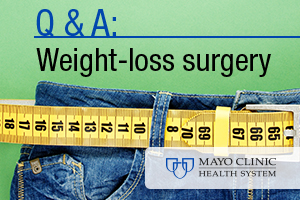Recent Posts
Frequently asked questions about bariatric surgery

How long will my surgery take?
This depends on the type of bariatric surgery you are having. If you are having a Roux-en-Y gastric bypass, surgery will typically take 2 1/2 to three hours. If you are having a sleeve gastrectomy, you can expect surgery to take 1 1/2 to two hours. Each case is individual, and these times are only rough estimates.
What are possible complications associated with bariatric surgery?
At your pre-op visit, your doctor will thoroughly review risks and potential complications with you. You will work together to complete a checklist of potential complications to be sure that you understand each one.
Although rare, complications may include bleeding, blood clots, breathing problems, infections, and death. You will receive antibiotics to prevent infection and medicine to prevent blood clots. We will get you up and moving after your surgery and will have you wear special compression boots when in bed, which also helps prevent blood clots.
Occasionally, your doctor will not be able to complete laparoscopic surgery and will have to switch to an open surgery. If this happens, you may need to stay in the hospital longer and will need to allow more time before returning to work. You will have time to talk to your doctor about any concerns or questions you have about risks before your surgery.
What kind of anesthesia will I have?
The anesthesiologist will meet with you before surgery to talk about your anesthesia. All patients having bariatric surgery will have general anesthesia. This means that you will be completely asleep during your surgery. The anesthesiologist will insert a tube through your mouth to help you breath. Your condition will be monitored closely by the anesthesiologist throughout your surgery.
Will I need a blood transfusion after my surgery?
Although uncommon, some patients may need to receive blood following surgery. A lab technician will come in to your room each morning to collect blood so we can monitor your condition closely. If you do need blood, our nurses will provide you with information on blood transfusions.
How long will I have to stay in the hospital?
Most patients will spend two nights in the hospital. For example, if you have surgery on a Monday, you can expect to go home after lunch on Wednesday.
How long before I can return to work?
Some people are able to go back to work two weeks after surgery. You may have to take more time off if you have other health concerns or if your job requires heavy lifting.
When can I eat regular foods?
If you have the gastric sleeve procedure, you will have full liquids, such as creamed soup and cream of wheat, for three weeks. If you have Roux-en-Y gastric bypass, you will need to eat a blended, or pureed, diet for several weeks. These foods do not have to be bland. You will work closely with our registered dietician to find soft foods that you like but that also provide the amount of protein you need. Gradually you’ll go back to eating a regular diet of healthy foods. It is important to know that there may be some foods that your system may not tolerate after surgery, such as red meat, certain breads and starchy foods.
Will I need cosmetic surgery?
Most patients do not choose to have cosmetic surgery. Patients are encouraged to exercise and maintain a healthy diet to minimize the need for cosmetic surgery. However, if you choose to have this type of surgery, we can refer you to a skilled plastic surgeon. Most insurance companies will not pay for cosmetic surgery unless it is medically necessary.
How much weight can I expect to lose?
The average patient loses about two- thirds of their excess bodyweight in the first 12 to 18 months after surgery. Your excess body weight is the difference between what you weigh now and what your ideal body weight is. For example, if you currently weigh 300 pounds and your ideal body weight is 150 pounds, you have 150 pounds of excess body weight. You could expect to lose approximately two-thirds of that weight, or 100 pounds. Most bariatric surgery patients do not actually get to their "ideal" weight.
In the year following surgery, you will tend to lose weight no matter how you eat or how active you are. To keep the weight off, you will need to eat a healthy diet and get plenty of exercise.






